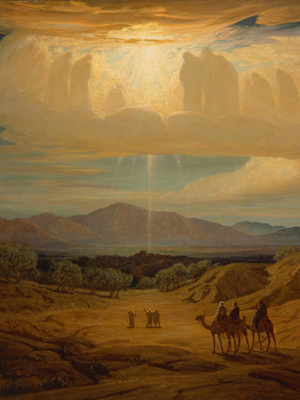Masonic Articles and Essays
The Inner Meaning of Christmas
The Very Illus..... Bro... Charles W. Leadbeater 33o
Date Published:
12/20/2023
The season of Christmas is a magical time of year. As the year comes to a close the world seems to take on an ethereal quality that stands apart from the rest of the year. But what energies, what inner workings are creating this effect. In this extract from Bro. Leadbeater's The Hidden Side of Christian Festivals we explore the inner meaning of the highest holiday of the Christian calendar.
 Upon consideration, Christmas Day reminds us of that first of the great Initiations, of which it is a symbol in the carefully arranged syllabus of the Church’s Year. We should think, then, what this first Initiation means for us–how it is indeed a second birth—a birth into the great White Brotherhood. During the preparatory season of Advent we have been considering the qualifications needed for it; now we should contemplate the thing itself and its results. We should realize how one who has taken that step has become safe for ever, and therefore may truly look upon the great World - Teacher as his Saviour—though not indeed from the mediaeval myth of everlasting torture. There is no such thing as that in nature, and there never has been; the whole thing is a frightful bogy which men have allowed to grow up and to terrify them. There is no eternal damnation to be saved from; the world needs a saviour from such a horrible idea, but not from the fact, because it is not a fact at all. Such a delusion is part of the error and the ignorance which causes all the trouble and all the suffering which we see around us.
Upon consideration, Christmas Day reminds us of that first of the great Initiations, of which it is a symbol in the carefully arranged syllabus of the Church’s Year. We should think, then, what this first Initiation means for us–how it is indeed a second birth—a birth into the great White Brotherhood. During the preparatory season of Advent we have been considering the qualifications needed for it; now we should contemplate the thing itself and its results. We should realize how one who has taken that step has become safe for ever, and therefore may truly look upon the great World - Teacher as his Saviour—though not indeed from the mediaeval myth of everlasting torture. There is no such thing as that in nature, and there never has been; the whole thing is a frightful bogy which men have allowed to grow up and to terrify them. There is no eternal damnation to be saved from; the world needs a saviour from such a horrible idea, but not from the fact, because it is not a fact at all. Such a delusion is part of the error and the ignorance which causes all the trouble and all the suffering which we see around us.
Verily is the World-Teacher a Saviour, not only for the Initiate, but for all of us; for it is His instruction which saves us from our own error and ignorance, and therefore from much of sorrow and of suffering, which are the necessary consequences of that ignorance. Not only should we look forward to the time when this wonderful Initiation shall be ours, but we should also make this an occasion of grateful rejoicing that for some it has already come. We thank God for His saints—for the elevation which they have given to humanity, not only by the encouragement of the example which they set before us, but by the actual uplift to the whole which each one of them has given in his own attainment . This uplift is a reality, by no means to be despised or forgotten; humanity is a brotherhood, little as most men recognize that fact, and the unity is so real that whenever one man attains, all the rest are definitely helped and raised by that attainment. So that should be another aspect of our Christmas joy.
I know that it comes as a shock to many good and earnest Christians to be told that the gospel story is not history, but truly myth. When one says that, people think at once: “You are taking away from us our Jesus, our Saviour. You are denying His historic existence.” We are not denying that at all, but we do hold that the gospel history as it is now written is not, and furthermore was never intended to be, an actual account of the life of that great World-Teacher, the Christ. We know but little of His true life-story. It seems certain that some parts of it were interwoven into this myth; it seems certain that some at least of the sayings which in the gospels are credited to the Lord Christ were really spoken by Him. But it is a matter of equal certainty that some of the others were not; and it is also plain to anyone who understands the subject, and has read something of comparative religion, that the whole account is cast in that allegorical form intentionally—that it represents not the life-history of any one man, but the spiritual history of every true follower of the Christ.
It is obviously not a history, but a drama—a collection of episodes, arranged as though for presentation on a stage. This idea, which seems so new to many, is not really new at all. It was quite manifest to the greatest of the Church Fathers. It is strange only to us, and it is strange because we inherit a great deal of the darkness of the Middle Ages. In these days we can no longer give blind faith to something which our reason shows us to be an impossibility. We need to comprehend what this beautiful story means, and it is quite easy to follow that. Origen, the greatest of the early Christian writers, explains the thing most lucidly. He says that there were in his time (and there certainly are now) two kinds of Christians. There were those whom he called the believers in “somatic” Christianity, which means bodily or physical Christianity. He makes it perfectly clear that by that expression he means those who believe in the story as a story, and he says of their doctrine: “What better could you have for the instruction of the masses” But he makes it abundantly evident that the spiritual Christian holds an altogether higher form of Christianity, in which he understands the inner meaning of all these allegories.
 Christ in each of His parables is represented to have told a story which had within it two inner meanings. First there was the purely physical tale for children, which described (for example) how the sower went forth to sow; secondly there was an intellectual explanation, whereby the seed is the word of God, the sower is the preacher, and the different sorts of ground are the different kinds of hearts on which it falls. Thirdly, there is always an inner and a still more spiritual signification which is not given out, which in this particular case is the pouring out of the divine life in many planes and into many worlds. It is always to this last, and highest interpretation of the Gospels that one should direct their inner vision should they wish the mysteries of Christmas, and indeed the entire Christian religion, to be made clear to those eyes that truly see.
Christ in each of His parables is represented to have told a story which had within it two inner meanings. First there was the purely physical tale for children, which described (for example) how the sower went forth to sow; secondly there was an intellectual explanation, whereby the seed is the word of God, the sower is the preacher, and the different sorts of ground are the different kinds of hearts on which it falls. Thirdly, there is always an inner and a still more spiritual signification which is not given out, which in this particular case is the pouring out of the divine life in many planes and into many worlds. It is always to this last, and highest interpretation of the Gospels that one should direct their inner vision should they wish the mysteries of Christmas, and indeed the entire Christian religion, to be made clear to those eyes that truly see.
More Masonic Articles
Explore articles and essays written by Freemasons about Freemasonry.
Read More
Membership
Interested in becoming a member of the worlds oldest Fraternal organization?
Read More